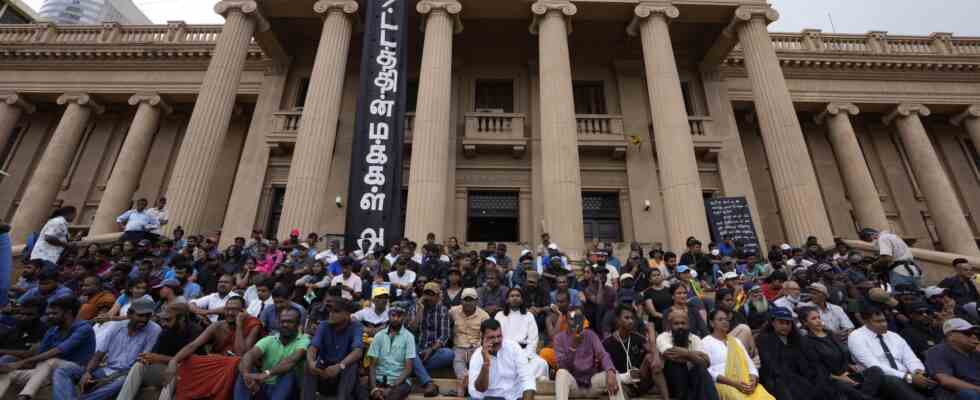interview
Status: 07/20/2022 3:29 p.m
The new President Wickremesinghe now has to tackle reforms quickly, analyzes Sri Lanka expert Heinze in an interview. But that also means making unpopular decisions. Can this go well?
tagesschau.de: What does the new president stand for?
Wolfgang Heinze: Ranil Wickremesinghe is also known as “the fox”. He is a seasoned politician and has been prime minister six times in the last three decades. However, he never managed to last his terms of office. He also has a great reputation in the West and has a lot of experience in crises. And he has the support of Parliament: many observers expected it to be a close race – but in the end Wickremesinghe won by a very comfortable majority.
To person
Wolfgang Heinze heads the representation of the Friedrich Naumann Foundation in Sri Lanka.
Little time to gain trust
tagesschau.de: After his election, the new president said that the division in the country had now been overcome. Does that apply to the situation – or is that optimism?
Heinze: Wickremesinghe does not have the support of the protesters. After the resignation of the previous President, Gotabaya Rajapaksa, protesters targeted Wickremesinghe and demanded his resignation. But as long as he doesn’t have the support of the population, there can always be large demonstrations and riots – and it can go so far that Wickremesinghe also has to resign in the end.
The big challenge will be: Will he be able to tackle important reform steps and thus bring back a little normality to the country in the perhaps short time that the population has given him?
tagesschau.de: Were there any alternatives to Wickremesinghe?
Heinze: After the resignation of Prime Minister Mahinda Rajapaksa – the ex-President’s brother – Wickremesinghe was the only one willing to become Prime Minister under the President. Therefore, he is said to have a close relationship with the Rajapaksas, who are not popular with the populace. The fear is that this will allow the Rajapaksas to continue influencing politics from abroad and may even return at some point.
“Wickremesinghe does not stand for a real new beginning”, Oliver Mayer, ARD New Delhi, currently Sri Lanka, on the new president
Tagesschau 12:00 p.m., 20.7.2022
Ruinous fiscal policy
tagesschau.de: What did the protesters accuse the Rajapaksas of?
Heinze: There was no solid budget under President Rajapaksa. The government itself has admitted that the budget was only covered for the first four months. The expenses in the remaining nine months were financed by printing money, i.e. via inflation – without adjusting the exchange rate at the same time. As a result, no more foreign currency came into the country and the import of important goods collapsed.
There is a severe shortage of petrol, people have to wait in lines stretching for miles for days to get a few liters of gas. There are problems with medical care. Cars have not been imported since 2019, there are shortages of spare parts. You have to drive across the country to search, but there’s no more petrol for that now.
tagesschau.de: Has the corona pandemic exacerbated the structural problems?
Heinze: Corona was one, but not the only “external shock”. The Easter 2019 bombings have had a very negative impact on tourist numbers. When the numbers got better again, Corona came. And when more tourists came again at the end of last year, the economic crisis became more and more noticeable – first through hour-long power cuts, which also affected travelers, and then through the lack of fuel – which also makes it difficult to travel through this beautiful country. And finally, as a result of the war in Ukraine, energy prices have risen sharply. The real cause, however, was Rajapaksa’s ruinous financial policy.
Before painful reforms
tagesschau.de: Which reforms must Wickremesinghe tackle first?
Heinze: First of all, he has to restore trust. The population must have the feeling that things can and will improve again now. Then he must return to sound fiscal policy. That means bringing back taxes that Rajapaksa slashed to previous levels. The state-owned companies are making huge losses – he’ll have to see that.
And he will have to reform the state apparatus, which employed a great many people under Rajapaksa. There are studies, for example, according to which every public bus has eleven employees. Many are wondering where the efficiency is. The reforms that Wickremesinghe must address are painful. Nobody is happy when taxes are increased and subsidies are cut. That is why he needs the support of the population.
tagesschau.de: Will she bring them up?
Heinze: Overall, the majority of citizens are remarkably patient. Of course there were riots, but most of the demonstrations were peaceful, few were injured or killed. The security forces also held back. When the Prime Minister’s residence burned, many condemned it. But there is also a noticeable radicalization. A court has now effectively issued a ban on demonstrations in the place where protests have been taking place for months. The protest movement will probably react to this.
New elections not possible
tagesschau.de: Would new elections be a solution?
Heinze: The requirement is there. But the constitution does not allow an election until March next year. The population must therefore continue to live with the MPs they elected in 2019.
tagesschau.de: Sri Lanka has been negotiating international financial aid with the International Monetary Fund (IMF) for a long time. Have the chances of an agreement increased with the new president?
Heinze: Negotiations are ongoing and there is hope for bridging aid and later further commitments from the IMF. But Sri Lanka will have to show itself that it is ready for reforms and will implement them. Otherwise there will be no major IMF involvement.
The conversation was led by Eckart Aretz, tagesschau.de

